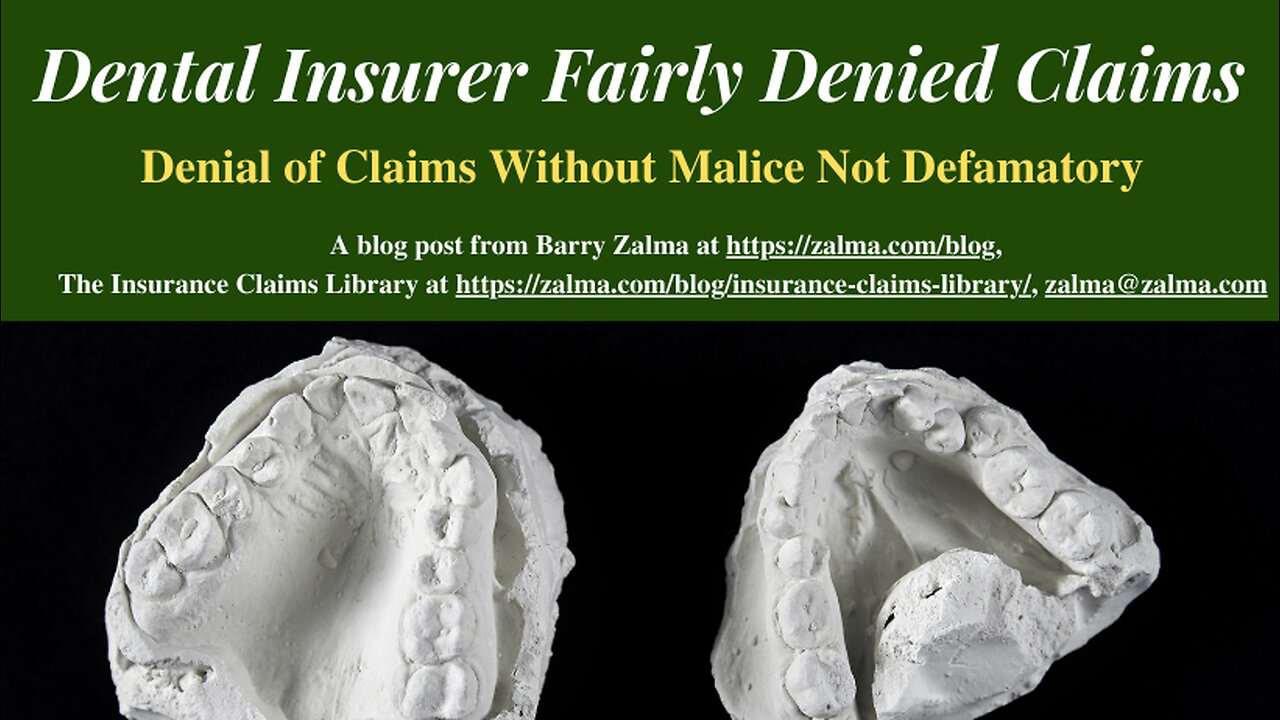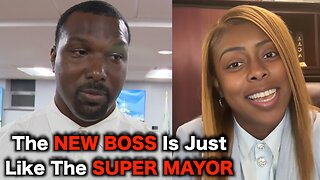Premium Only Content

Dental Insurer Fairly Denied Claims
Denial of Claims Without Malice Not Defamatory
Plaintiffs SmileDirectClub and Smile of Tennessee, PC (SDC), sued Delta Dental and argued that they made sufficient allegations of malice based on Delta Dental's knowledge of the falsity and/or reckless disregard of the truth of statements about the do-it-yourself nature of plaintiffs' clear aligner therapy.
In SmileDirectClub, LLC, and Smile Of Tennessee, P.C. v. Delta Dental Plans Association, 2022 IL App (1st) 220208-U, No. 1-22-0208, Court of Appeals of Illinois, First District, Fourth Division (December 8, 2022) the Illinois Court of Appeals resolved the dispute.
BACKGROUND
Plaintiffs offer dental support organization services and a "med tech platform" that enable licensed dentists and orthodontists to treat patients with mild to moderate malocclusion with clear aligner therapy using a teledentistry platform.
Defendant Delta Dental is a nonprofit association of 39 member companies that provide Delta Dental-branded dental insurance and dental plan administrative services to insureds and employers. Delta Dental, by and through its affiliated member companies, provides insurance for approximately 75 million people nationwide, and approximately 25% of SDC's customers were insured by Delta Dental affiliates.
Plaintiffs offered the dental service of aligner therapy as a remote alternative to traditional in-office orthodontics. They advertised their product in part by emphasizing the convenience they provided to customers by offering a dental care solution that did not require visits to a traditional dentist's office.
In 2017, the American Dental Association (ADA) passed resolution 50, which "strongly discourage[d] the practice of do-it-yourself orthodontics because of the potential harm to patients." The ADA argued that self-made dental impressions were "almost inherently of little clinical value" because it was "difficult for a trained, experienced professional to make good dental impressions of a patient's teeth even in the controlled environment of an office equipped to take and retake such impressions, and it is important to be able to see and examine the patient while the impressions are being taken."
Delta Dental some time after the ADA statements issued a policy directive to its members for the denial of all claims for coverage of SDC clear aligners. Accordingly, Delta Dental members issued insurance claim denial letters to insureds seeking coverage for treatment with SDC's clear aligners. The denial letters referenced, in varying terms, the self-application and mail-order nature of SDC's services as the reason for coverage denial.
In 2020, plaintiffs sued. Ultimately, plaintiffs filed a seven-count, third amended complaint against Delta Dental only, alleging (relevant to the appeal) that Delta Dental and its member companies wrongfully denied insurance benefits to their insureds for the cost of plaintiffs' dental aligner therapy as part of a conspiracy to defame, disparage and interfere with plaintiffs' teledentistry business.
Plaintiffs' allegations that Delta Dental acted with malice are based on Delta Dental's and its members' alleged knowledge that the aligner therapy was overseen by licensed dentists, and SDC's argument that the ADA has a history of anti-competitive behavior.
On January 25, 2022, the circuit court dismissed counts I to VI of the third amended complaint with prejudice, ruling that a qualified privilege applied to the member companies' statements about the self-administered nature of plaintiffs' aligner therapy because those companies had a legal duty to explain to their insureds the reasons for the companies' denials of the insureds' insurance claims. The court also ruled that plaintiffs failed to sufficiently allege malice to overcome the qualified privilege given the evidence of the public controversy over the safety and efficacy of plaintiffs' aligner therapy
ANALYSIS
A motion to dismiss requires the court to accept all well-pleaded facts in the complaint as true and draw all reasonable inferences from those facts in favor of the nonmoving party. The court may consider only those facts apparent from the face of the pleadings, matters of which the court can take judicial notice, and judicial admissions in the record.
Civil Conspiracy to Defame and Disparage
Plaintiffs first argued that the statements in the insurance coverage claim denial letters that members of Delta Dental issued to insureds were defamatory and disparaging. They claimed that because the statements gave the do-it-yourself or self-application nature of the aligner therapy as the reason for the coverage denial even though Delta Dental and its members knew that licensed dentists supervised the aligner therapy.
Delta Dental responded that the parties' dispute involves the extent to which licensed dentists were involved in the care of insureds who bought plaintiffs' remote access, self-administered orthodontic therapy. Delta Dental argued that the challenged statements were substantially true. Truth, of course, is always an absolute defense to a defamation action.
To show a defamation claim, a plaintiff must present facts showing that the defendant made a false statement about the plaintiff, that the defendant made an unprivileged publication of that statement to a third party, and that this publication caused damages. Disparagement is defined as statements about a competitor's goods which are untrue or misleading and are made to influence or tend to influence the public not to buy.
The definition of disparagement can be broken down into three elements. The statement
must be about a competitor's goods or services,
must be untrue or misleading, and
must have been made to influence or tend to influence the public not to buy those goods or services.
Defamatory statements may not be actionable if immunized by an absolute privilege if shielded under the innocent construction rule, if safeguarded as an expression of opinion, or if protected by a qualified privilege. Whether or not an allegedly defamatory statement is protected by an absolute or qualified privilege is a question of law to be determined by the court.
Because the Court of Appeals found that the statements included in the insurance claim coverage denial letters to the insureds are protected by a qualified privilege, there was no need to address Delta Dental's alternative arguments.
The qualified privilege serves to enhance a defamation plaintiff's burden of proof. The privilege may protect the speaker from liability regardless of the statement's contents. To overcome the privilege, the plaintiff must show not just that the statements are untrue, but that the defendant abused the privilege by intentionally publishing false material or by displaying a reckless disregard as to its truth or falsity-meaning that the defendant entertained serious doubts about the truth of the statement but failed to properly investigate the truth.
Plaintiffs presented no evidence that Delta Dental or its members abused the qualified privilege, either by intentionally making false statements or by acting with reckless disregard as to the truth of the challenged statements. Delta Dental and its members were entitled to disagree with plaintiffs regarding the sufficiency of the level of dentist supervision in SDC's alignment therapy.
The court concluded that plaintiffs failed to allege malice sufficient to show that Delta Dental and its members abused the qualified privilege and affirmed the trial court's dismissal of plaintiffs' claims regarding defamation and disparagement with prejudice.
Civil Conspiracy to Interfere with Business Relations
To state a cause of action for tortious interference with business relations, a plaintiff must allege:
the existence of a valid business relationship (not necessarily evidenced by an enforceable contract) or expectancy,
knowledge of the relationship or expectancy on the part of the interferer,
an intentional interference inducing or causing a breach or termination of the relationship or expectancy, and
resultant damage to the party whose relationship or expectancy has been disrupted.
Plaintiffs' attempts to plead malice were insufficient. They failed to provide supporting details beyond conclusory statements of malicious intent to sustain their claims.
CONCLUSION
Plaintiffs' amended complaint alleging civil conspiracy to defame, disparage, and tortiously interfere with plaintiffs' business relations was properly dismissed with prejudice based on plaintiffs' failure to sufficiently allege malice and thereby defeat defendant's qualified privilege regarding the challenged statements.
ZALMA OPINION
In a creative way to sue an insurer who refused to pay claims for dental services by claiming that the letters the insurer issued denying the claims were defamatory and maliciously damaged the plaintiffs. The plaintiffs were unable to establish that the statements made in the denial letter were not true so the defamation claim failed. They were also unable to show a malicious intent because they only issued conclusory statements of malicious intent. The plaintiffs tried to get around the meaning of the contracts that Delta Dental had with its insured and tried to compel payment of claims not covered by the wording of the policy.
(c) 2022 Barry Zalma & ClaimSchool, Inc.
Subscribe and receive videos limited to subscribers of Excellence in Claims Handling at locals.com https://zalmaoninsurance.locals.com/subscribe.
Go to substack at substack.com/refer/barryzalma Consider subscribing to my publications at substack at substack.com/refer/barryzalma
Barry Zalma, Esq., CFE, now limits his practice to service as an insurance consultant specializing in insurance coverage, insurance claims handling, insurance bad faith and insurance fraud almost equally for insurers and policyholders. He practiced law in California for more than 44 years as an insurance coverage and claims handling lawyer and more than 54 years in the insurance business. He is available at http://www.zalma.com and zalma@zalma.com
Write to Mr. Zalma at zalma@zalma.com; http://www.zalma.com; http://zalma.com/blog; daily articles are published at https://zalma.substack.com.
-
 8:57
8:57
Barry Zalma, Inc. on Insurance Law
1 year agoNo Coverage for Benefits no Right to Bad Faith Damages
209 -
 20:16
20:16
DeVory Darkins
9 hours ago $2.39 earnedTulsi Gabbard shocking update regarding russia hoax against President Trump
3.85K22 -
 2:04:33
2:04:33
"What Is Money?" Show
17 hours agoThe Dollar is Rotten: A Winemakers Journey to Bitcoin w/ Ben Justman
9.61K5 -
 5:30
5:30
Michael Knowles
17 hours agoCBS Cancels Stephen Colbert’s Late Show
23.9K27 -
 11:49
11:49
Nikko Ortiz
16 hours agoCrazy Instant Karma Clips
15.6K8 -
 LIVE
LIVE
MrR4ger
1 hour agoSOLO DOLO QUESTING - ESCAPE FROM TARKOV PVE IS FUN??? *NEW R4GER RIFFS MONDAY!!**
87 watching -
 LIVE
LIVE
Anvilight
4 hours agoWorld of Warcraft | Returning to Scotland AND Azeroth! | Scotsman Unites The American Clans
39 watching -
 16:21
16:21
Actual Justice Warrior
22 hours agoSuper Mayor Replacement SCAMS Voters
17.9K14 -
 LIVE
LIVE
Sacred Sage
2 hours ago $0.06 earnedClair Obscur: Expedition 33: How MASSIVE Is This Map?!
32 watching -
 LIVE
LIVE
The Goon Room
3 hours agoConan Exiles Restart
67 watching